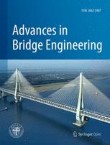Climate change has significant impacts on the safety and serviceability of bridges. The frequency and magnitude of extreme events have increased. It is important to mitigate climate change and adapt bridges to climate change impacts. Recently, the advancement in artificial intelligence (AI) technologies, such as advanced computational technologies and robotics, has created thrilling opportunities in bridge engineering. On one hand, AI technologies have been applied to help understand and predict climate change and extreme events as well as their impacts on bridges. On the other hand, AI technologies have been applied to enhance the capabilities of mitigating climate change and adapting bridges to climate change impacts. AI technologies have shown a great potential to automate the design, construction, operation, monitoring, maintenance, and rehabilitation of bridges. Recent research outcomes have shown that it is promising to utilize AI technologies to improve the sustainability, resilience, and intelligence of bridges.
This special issue is intended to collect and exchange new ideas, new concepts, new methods, new practices, and new results of AI assisted bridge engineering, aiming at promoting research on AI technologies for improving the sustainability, resilience, and intelligence of bridges. The relevant topics of this special issue include, but are not limited to:
- Advanced modeling and prediction of climate change impacts on bridges
- Machine learning-based assessment and prediction of extreme events for bridges
- Machine learning-based evaluation and enhancement of the resilience of bridges
- Machine learning-based design of advanced materials for bridges
- Machine learning-based modeling of bridges and bridge components
- Advanced computational methods for design and optimization of bridges
- Advanced computational methods for life cycle assessment and optimization of bridges
- Robot-assisted manufacturing, construction, and rehabilitation of bridges
- Robot-assisted condition inspection and assessment of bridges
- Machine learning-based analysis and interpretation of sensor data for monitoring bridges
- Machine learning-based operation and preservation of bridges
- Digital twin for the construction, operation, and operation of bridges
Submission deadline: 31 August 2024
Guest Editors
Dr. Ansari Farhad, University of Illinois at Chicago, USA
Dr. Yiqing Ni, Hong Kong Polytech University, China
Dr. Jian Zhang, Southeast University, China
Dr. Alessandro Sabato, University of Massachusetts Lowell, USA
Dr. Kai Wei, Southwest Jiaotong University, China
Dr. Yi Bao, Stevens Institute of Technology, USA
